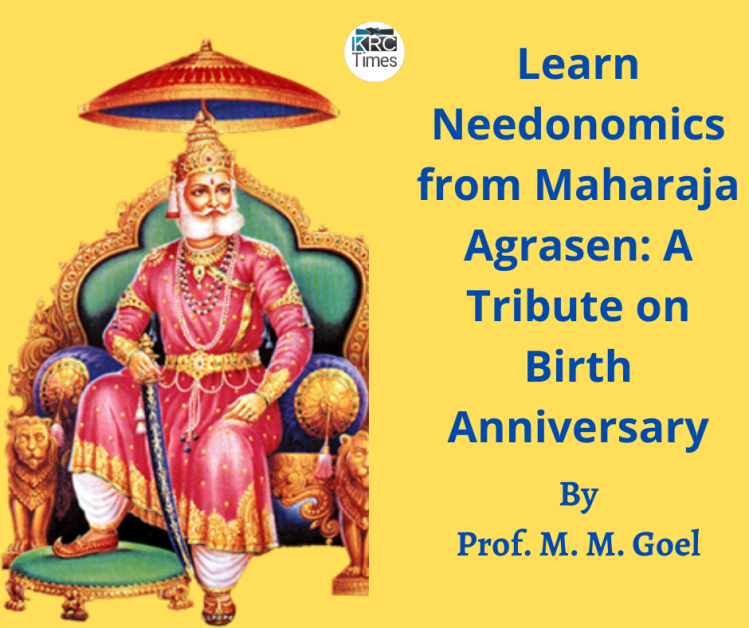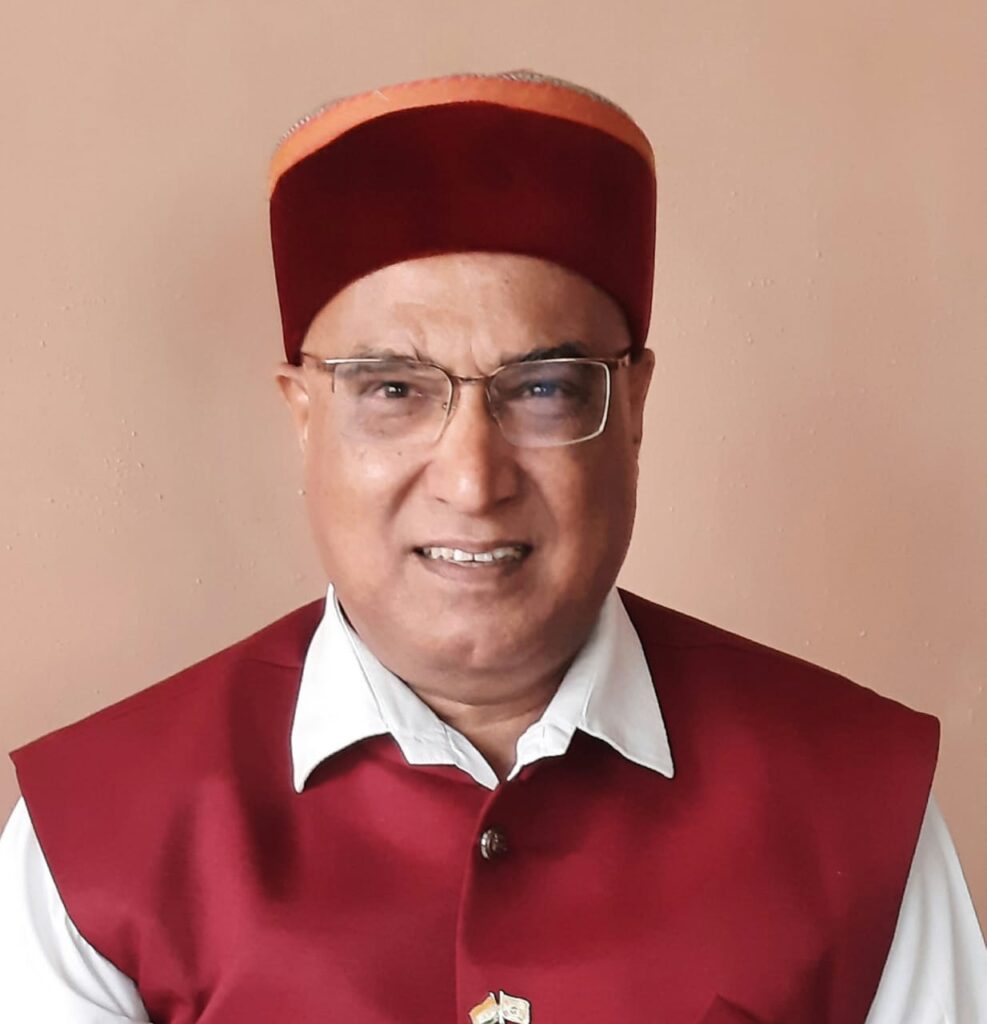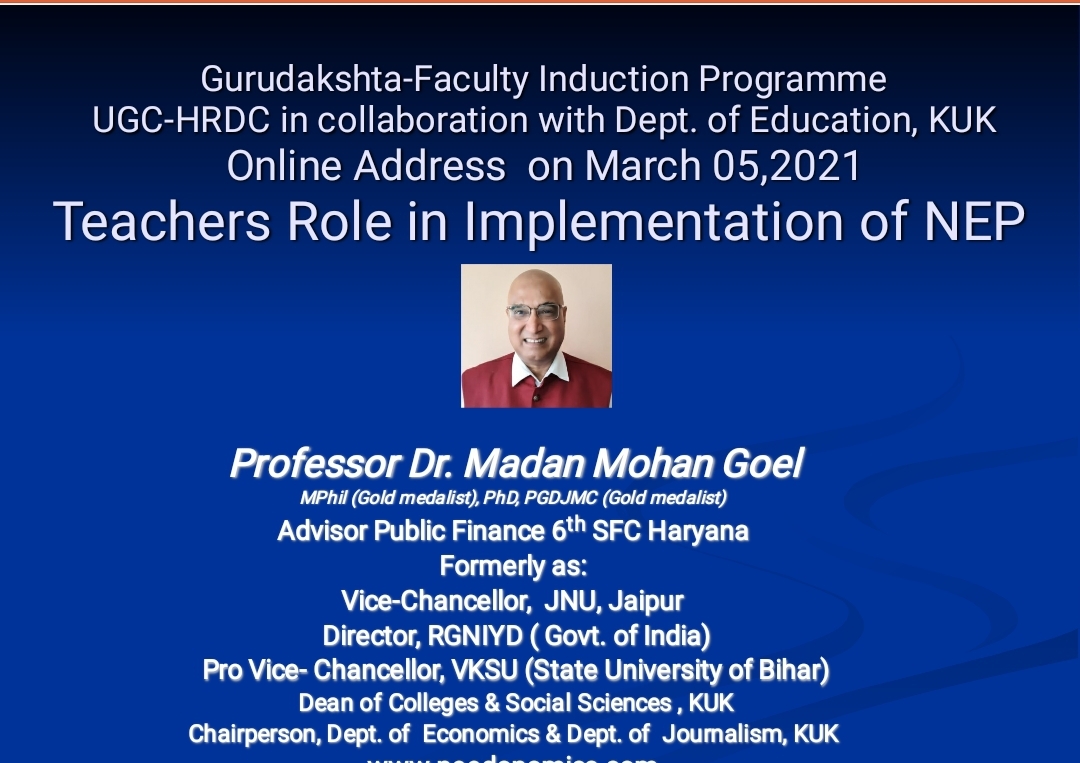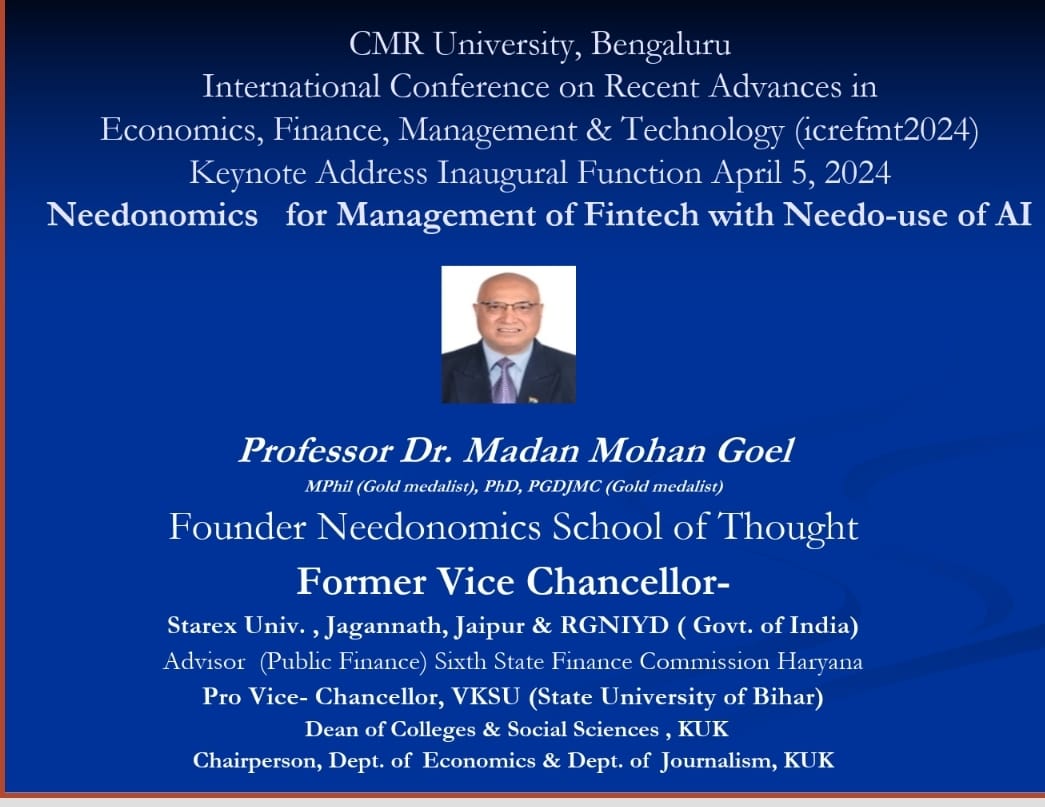We should respect humanity without prejudice to anyone on considerations of caste, community, wealth, occupation and religion
 Dr. M. M. Goel
Dr. M. M. Goel

To commemorate Maharaja Agrasen Jayanti not only as an annual ritual, but we should also imbibe the spirit of social service with altruism as per his guidance. We have to understand, analyse, interpret and adopt needonomics (economics of needs) necessary for the survival, existence, and excellence of every human being for ensuring Atmanirbharta (Self-reliance). We need REACH model consisting of five steps including reading Gita, empowerment with enlightenment, altruistic approach, commitment, and holding needs to obtain atmanirbharta.
The birth anniversary of Maharaj Agrasen is annually observed on the first day of the waxing phase of the moon in Ashwin month – Ashwin Shukla Paksha Pratipada, this year on October 07. He was a Suryavanshi King at Agroha (Haryana) in Dwapar Yuga contemporary to Lord Krishna.
The present business community of today has to learn Corporate Social Responsibility (CSR) as a necessary and sufficient condition for inclusive growth which means to care for the cared less (not care less) and use of the used less (not useless) manpower needed in the economy to face the challenges of all kinds including covid. The marvellous tradition of giving one coin and brick to any newcomer for starting a new business to earn a living in Agroha is worth replicating in present times of unemployment and underemployment caused by lockdowns.
The amended Companies Act 2013 made the provision of 2 per cent of the average net profit (with a rider of Rs 5 crore or more profit in the past three years) of the companies be spent on CSR. They are required to spend on CSR with self-regulation, transparency and compliance that may be acceptable to the stakeholders. But, let them feel motivated by Maharaja Agrasen who was a strong protagonist of spending 25 per cent of the income on the welfare of living beings in the society. He also made a case for 25 per cent savings for the future which is a necessary and sufficient condition for coping with a financial crisis of any kind as in present times when the quality of life is becoming expensive with inflation beyond control.
We should respect humanity without prejudice to anyone on considerations of caste, community, wealth, occupation and religion. The farming community producing food grains were respected in his kingdom. The service of a cow was the best service. To provide relief to one and all was the honest goal for him. The marvellous tradition of giving one coin and brick to any newcomer for starting a new business to earn a living is worth replicating in present times of unemployment and underemployment. He never discriminated against anyone and the subjects were very pleased with the way he conducted himself.
The Agrawal community with 18 gotras (sub-caste) of India traces its origin to King Agrasen.-a a legendary Indian king of Agroha, a city of traders now in Haryana. near Hissar. He is credited with the establishment of a kingdom of traders in North India and is known for his compassion in refusing to slaughter animals in yajnas. The Government of India issued a postage stamp in honour of Maharaja Agresen in 1976.
An icon of non-violence, the messenger of peace, Maharaja Agrasen was an embodiment of sacrifice, compassion, non-violence, peace, progress, prosperity, and true socialism. He was the eldest son. of King Ballabh of Pratapnagar during the last stages of Dvaapar Yug. According to the current calendar, the birth of Maharaj Agrasen took place about 5145 years ago. King Ballabh was a Suryavamshi (lineage from the Sun). Even when he was very young, Prince Agrasen was very well known for his compassion.
Agrasen was a vysya king of the Solar Dynasty who adopted Vanika dharma for the benefit of his people. Literally, Agrawal means the “children of Agrasen” . Noted Hindi author Bharatendu Harishchandra (himself an Agrawal) wrote Agarwalon ki Utpatti (The origin of Agrawal’s) in 1871. based on an account in the Mahalakshmi Vrat Katha manuscript.. According to this account, Maharaja Agrasena was a Suryavanshi Kshatriya king, born during the last stages of Dwapar Yuga in the Mahabharat epic era, he was contemporaneous to Lord Krishna. He was the eldest son of the King Ballabh of Pratapnagar. Agrasena fathered 18 children, from whom the Agrawal gotras came into being.
Agrasen attended the swayamvara of Madhavi, the daughter of the King Nagaraj. However, Indra, the God of Heaven and also the Lord of storms and rainfall, wanted to marry Madhavi, but she chose Agrasen as her husband. A furious Indra decided to take revenge by making sure that Pratapnagar did not receive any rain. As a result, a famine struck Agrasen’s kingdom, who then decided to wage a war against Indra. Sage Narada was approached by Indra, who mediated peace between Agrasena and Indra.
According to Vachanakosha of Bulakhichand (1680 AD), Agar Rishi married a naga-kanya and had 18 children.. A similar account is given in 1885 Bombay Presidency Gazetteer, Rishi Agrasena married 17 naga-kanyas..
For the prosperity, progress and peace of the people, Maharaja Agrasen performed many yagnas ( sacrifice). In those days, performing a yagna was a symbol of prosperity. During one such yagna, Maharaja Agrasen noticed that a horse that had been brought to be sacrificed was trying hard to get away from the sacrificial altar. Seeing this Maharaja Agrasen was filled with pity and then thought as to what prosperity can be achieved by sacrificing mute animals. The idea of Ahimsa grabbed Maharaja Agrasen’s mind. The King then discussed it with his ministers. The ministers then said if Maharaja Agrasen turned towards ahimsa, the neighboring kingdoms might consider it a sign of weakness and feel brave enough to attack Agroha. At this, Maharaja Agrasen mentioned that putting an end to violence and injustice does not mean weakness. He then proclaimed that there should be no violence and killing of animals in his kingdom. It is said that, the way Mahraja Agrasen used to deal with business problems was really great. And this is the reason why King Akbar had two Agarwal in his group of ministers. One was Todarmal, who introduced the land systems and another one was Madhushai who have made us proud in history.
Let us learn lessons from his memorable life of compassion with sermons of cooperation and coexistence in present world of competition with lessons of needonomics. Even if weak we have to become unique to survive in the rat race of the survival of the fittest in present times. Let the business community of today feel motivated for CSR from Mahraja Agrasen Ji. There is a strong case for income tax exemption for the expenditure on CSR.

(Prof M M Goel is Vice-Chancellor Starex University Gurugram www.starexuniversity.com and Founder Needonomics School of Thought www.needonomics.com)
Advertisements | 5E For Success

5 Advantages of KRC 5E MDP program, powered by KRC Foundation.
1. Employability training
2. Internship
3. Earn while you learn ( Work Experience Certificate, subject to selection and performance)
4. 100% Cashback on Fees through Global Garner
5. KRC Membership & Placement assistance.
Send your resume to get a free profiling session and selection.
Email resume: 5eforsuccess@gmail.com
WP: 9330830083





